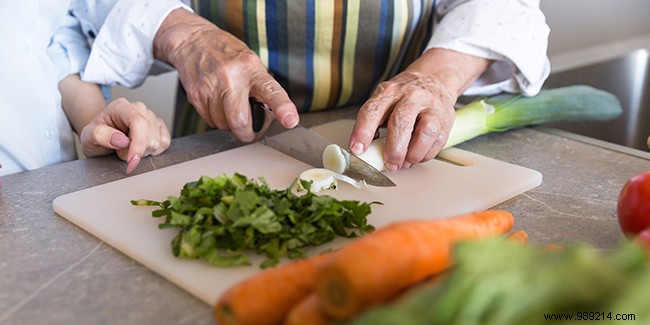 Seniors have somewhat specific energy and nutritional needs:it is clear that we do not eat the same way at twenty as at sixty or more!
Seniors have somewhat specific energy and nutritional needs:it is clear that we do not eat the same way at twenty as at sixty or more!
With age, certain foods are to be avoided in the same way as others become true allies against the decline in form and morale. What are the foods to favor and the specific needs at this time of life?
Although physical activity tends to decrease with age, this does not mean that you need to eat less:due to age-related changes, metabolic performance is altered and therefore leads to higher nutritional requirements. The risk of deficiencies, in proteins and lipids in particular, then increases in the elderly, which represents a possibility of malnutrition or even undernutrition in the event of a major drop in appetite.
Thus, fast sugars and fats are not harmful, contrary to what we thought when we "pay attention to our line" ten years earlier. Slow sugars (bread, starches) are still as beneficial and vitamins, more essential than ever:you have to bet on fruits and vegetables, but also know how to have fun with sweets!
In the elderly, calcium intake is essential because its assimilation is altered by aging:the recommendations are 1,200 to 1,400 mg / day, against an average of 1,000 between 20 and 50 years. In addition, the risk of osteoporosis increases for seniors because bone mass tends to decrease, especially in women.
To overcome this fragility, it is believed that it is enough to consume foods that contain calcium that can be directly absorbed by the body, namely fresh dairy products (milk, yogurt, cottage cheese) and cheeses. But it's not that simple because milk and dairy products also contain proteins that acidify the blood. And to fight against this acidity, the body uses calcium and other alkaline minerals located in the bones. So there is then a risk of decalcification, paradoxically.
We must therefore drink milk and eat dairy products but without excess, and especially combine them with other sources of calcium for our bones, such as fish, oleaginous dried fruits, spinach, broccoli, dried beans, soy, citrus fruits or apricots, all rich in calcium.
Even if the meat becomes less appetizing with age and you move less, you should not neglect the protein intake:after fifty years, they are still important and help fight against muscle weakness. If proteins are found in large quantities in red meat, this is not the most recommended for seniors, because it is extremely rich.
But there are other ways to provide the body with the proteins needed:fish, poultry (or other white meat, pork for example) as well as eggs, soya, and especially pulses (lentils , chickpeas, beans). Finally, a sufficient fiber intake is essential for transit:we prefer organic wholemeal bread to white bread which is full of additives.